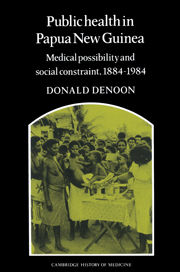Book contents
- Frontmatter
- Contents
- Acknowledgements
- Maps of Papua New Guinea
- Introduction
- I The rise and fall of tropical medicine
- 1 Pre-colonial health and disease
- 2 The administration of public health
- 3 Early colonial medical administration
- 4 The political economy of health in Papua between the wars
- 5 The political economy of health in New Guinea between the wars
- 6 Medical education
- 7 The Pacific War: the condition of the people
- II The rise and fall of the great campaigns
- Notes
- Bibliography
- Index
4 - The political economy of health in Papua between the wars
Published online by Cambridge University Press: 11 February 2010
- Frontmatter
- Contents
- Acknowledgements
- Maps of Papua New Guinea
- Introduction
- I The rise and fall of tropical medicine
- 1 Pre-colonial health and disease
- 2 The administration of public health
- 3 Early colonial medical administration
- 4 The political economy of health in Papua between the wars
- 5 The political economy of health in New Guinea between the wars
- 6 Medical education
- 7 The Pacific War: the condition of the people
- II The rise and fall of the great campaigns
- Notes
- Bibliography
- Index
Summary
The search for the mainspring of medical policies and programmes must begin with the colonial state, which employed most of the doctors who declared the policies and launched the programmes, and which influenced the behaviour of mission doctors and nurses. It is necessary, therefore, to describe the general purpose of the colonial state and its financial basis. This approach assumes that the colonial state directs its resources (including medical skills) towards the needs of the fledgling colonial economy. When we test that assumption, however, it proves unsatisfactory: it is impossible to construe medical programmes simply and mechanically as the state's contribution to capitalism. We adopt that approach to see how far it will take us, and to gauge the extent of doctors' autonomy in policymaking. Since there were two colonial states from 1884 until the Pacific War in the 1940s, we also take the opportunity to consider each on its own in order to seek out comparisons and contrasts. What follows, therefore, is an investigation of the ‘political economy’ of health policies and programmes setting matters of public health in the constitutional and economic circumstances of each of the dependencies.
British New Guinea, the south-eastern quarter of New Guinea, was a Cinderella among British dependencies. From 1884 when it became a protectorate, this ‘oddity of empire’ was administered by British officers, and paid for (grudgingly) by the Australian colonies. The new Commonwealth government accepted responsibility for Papua in 1906.
- Type
- Chapter
- Information
- Public Health in Papua New GuineaMedical Possibility and Social Constraint, 1884–1984, pp. 33 - 42Publisher: Cambridge University PressPrint publication year: 1989

